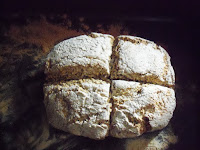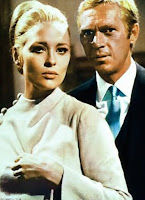
James Murdoch, the son of Rupert, has gone a bit wiggy on the subject of the BBC. In a speech in Edinburgh, he described it as a satanic cult which sucks out of you the very will to live. I’m paraphrasing, obviously. Then he and Robert Peston, the BBC’s business person, started yelling each other at a dinner in front of Kirsty Wark. One of them actually said fuck. In front of stern, respectable Kirsty. The newspapers went crazy. The message boards on The Guardian lit up with exercised citizens saying things like ‘At last, Auntie grows a pair of balls’, and there was a lot of lovely lefty comment about the spoiled sons of billionaires throwing their toys out of the pram.
Actually, if you go and read the speech, it is pretty much plutocratic, free market, management-speak boilerplate. There is a slightly inexplicable diversion into creationism as Murdoch tries to make the very strained analogy of BBC operatives as mad creationists, while he is the lucid Darwinian. It might strike some as surprising that a person would choose this particular moment to mount a rampantly unapologetic defence of capitalism red in tooth and claw, just as that same unfettered capitalism has brought the world to the brink of economic collapse. But the speech itself is not quite as shocking as the reporting might suggest, until you get to the very end. It is as if Murdoch has tried to be fairly sensible, and then, in the final paragraphs, he just can’t help himself. ‘The expansion of state-sponsored journalism is a threat to the plurality and independence of news provision, which are so important for our democracy,’ he states. ‘As Orwell foretold, to let the state enjoy a near monopoly of information is to guarantee manipulation and distortion.’ He does not explicitly call the BBC Orwellian, as some papers have insisted, but the implication is very clear.
What is really fascinating about this is that it is Murdoch himself who is using a form of doublespeak. I agree with him that a media controlled by the state would be a ghastly thing; shades of North Korea and endless broadcasts praising the Dear Leader. Any government which can censor the news or put out propaganda instead of objective reporting is a severe threat to the democracy that Murdoch so cherishes. But if you take those sentences out of the speech, and let them walk the streets of the actual world, where real people live actual lives, you can see at once how absurd they are. The BBC is not state-sponsored. It is true that it is incorporated by Royal Charter, and so technically dependent for its very existence on our own dear Queen (gor bless you ma’am) but only the very wildest Bilderberg conspiracy theorists would believe that Her Majesty is sitting at an undisclosed location deciding what John Humphreys is going to say on any given morning. The government has the power to approve the licence fee, which is a very long way from ‘sponsoring’, let alone having any power over the content that the BBC sends out into the world. Far from being a puppet of the state, or more specifically the Labour government, the BBC seems to play a happy parlour game of pissing off elected officials. Certain elements of the Right believe that the BBC is involved in an elaborate plot to make sure that black lesbian one-legged single mothers end up ruling the world, with an assist from illegal immigrants. Parts of the Left think that the Beeb is a cringing, pro-Establishment, Oxbridge-infested Trojan horse, determined to bring down New Labour with its own bare hands – remember Alistair Campbell busting into Channel Four news after the Gilligan affair to foam at the mouth live on air? It seems to me that if both sides of the political divide accuse the BBC of bias, then it must be hitting pretty much the right note.
But quite aside from its attitudes or perceived biases, the BBC does not belong to the state at all. It belongs to the people. I know this sounds like the kind of thing a naive unreconstructed bleeding heart liberal like me would say, but it is true. We, the people, pay the licence fee. The BBC Trust is responsible to us. Its remit is to ‘represent the views of the licence-fee payers’ and to ‘ensure the public interest’. Nowhere in even the smallest print of its charter does it say that it must ‘keep Gordon Brown happy’ or ‘advance the devious plots of the State’.
Far from pursuing Orwellian mind-meld, the BBC provides the British public with the most trusted news brand in the world. If you asked the man on the Clapham omnibus, or the lady on the N17, whether they felt manipulated and brainwashed by the BBC, they would both look at you as if you needed strong medication and a lie down in a darkened room. What is even more interesting is that, earlier in the speech, in the less mad part, Murdoch insists that he trusts ‘consumers’ above all. It is his mantra: trust the people. The people trust the BBC. Which slightly busts open his entire argument.
The BBC, like that other beloved British institution, the NHS, is not perfect. BBC3 is a joke. The great dramas that used to stalk BBC1 are now rare as hen’s teeth. Auntie has never offered any contemporary series as beautifully written and compelling as The Wire or The West Wing. The comedy on Radio Four is often frankly embarrassing – Count Arthur Strong, anyone? But against all that are the shining jewels of the BBC – The Today Programme, Question Time, Newsnight, everything David Attenborough has ever done. There is John Simpson and Jeremy Paxman and the entire Dimbleby family. ‘Richard Dimbleby,’ says my mother. ‘That was the voice of the BBC. I remember that hushed voice, as if the Queen must not hear.’ Would any free market, consumer-driven, profit-led organisation ever, in any country, produce a series such as In Our Time, where Melvyn Bragg sits down once a week with a panel of professors and discusses everything from quantum physics to The Peasants’ Revolt? And on radio, where no one can even see his magnificent hair?
The BBC produces some absolute rubbish, but it also does things no privately owned corporation would consider. For all The Sun’s vocal support of Our Brave Boys, would the Murdochs provide something such as the British Forces Broadcasting Service, where the BBC devotes two channels to programmes for the troops serving overseas? Or set up a Gaelic language television channel in Scotland as the BBC did last year? Would any profit-driven organisation run the equivalent of the BBC Asian network? Which private company would keep the World Service going? What would happen to the Persian network, which proved so pivotal during the recent events in Iran?
In his final, bizarre, ringing sentence, James Murdoch says: ‘The only reliable, durable and perpetual guarantor of independence is profit.’ I could parse that until I was blue in the face, but I am not going to insult your intelligence. A child of ten can understand that profit is not a moral indicator, or a driver of anything. Profit is just itself; it is hard cash; it is reward for a successful business. It guarantees nothing except pay packets and investor dividends. To take this amazingly idiotic logic to its final conclusion, you would have to accept that all non-profit organisations, from Amnesty International to Medicins Sans Frontiers are, by definition, deprived of independence. In fact, you could argue that large corporations built exclusively on the profit motive are utterly dependent: on the whims of their proprietors, the shifting sands of public opinion, the unexpected lurches of global finance. And also, just because I’m on the subject: independent of what? The more I read that sentence, the more meaningless it becomes.
What Murdoch clearly wants is a model like that of America, where there is little regulation and no BBC. There is poor NPR, which struggles courageously on through the brave new world, but has nothing like the scope and range of the BBC and is reduced to begging its subscribers for cash. The rest of the radio landscape is dominated by the shoutiest of shouty voices, extremist nuts, and Rush Limbaugh. We have Melvyn, they get Rush. America produces some of the best television programmes in the world, but the actual watching experience is marred by advertisements every seven minutes, so one minute you are watching Jack Bauer and his miraculous never-needs-recharging mobile telephone, and the next moment you are watching an advertisement instructing you how to cure your piles or get a better erection. I am going to go out on a limb and say that the major US news networks cannot hold a candle to the BBC. Because of the profit motive that Murdoch adores so much, serious, respected news anchors like Brian Williams have to insert snazzy little showbiz items into their broadcasts in a way that Huw Edwards would never have to put up with.
Then there are the wilder shores of cable. CNN, the little station that could, had its moment of glory during the first Gulf War, when its reporters bravely stayed in Baghdad under fire and scooped the huge organisations who had pulled out. Now it seems to me a bit of a joke, with gimmicky sets, and reporters reduced to reading out Twitter feeds on air rather than doing any actual reporting. (I love Twitter, but I am not sure that its place is in a serious news programme.) MSNBC sometimes rises to great heights: Rachel Maddow is currently mounting a spirited campaign to investigate the organisations behind the ‘grass roots’ opposition to President Obama’s healthcare plan, but it is spotty and prone to sensationalism and sentimentality. It is often entertainment, more than news.
I admit my own bias freely. I love and revere the BBC. I cannot imagine life without Radio Four, which is on in every room in my house. I am permanently grateful for Lord Reith and his founding notion that broadcasting should educate, inform and entertain. But I suspect I am not alone. There is a reason that the Beeb is a cherished part of British national life, where Sky is not. Britons are not a bunch of crazed statist commies, as they have been lately depicted in certain parts of the American media, but I think they understand very well that there is more to life than profit. If recent economic events have shown us anything, it is that profit is not always king. Perhaps I am getting a little too misty-eyed, but I actually think that James Murdoch should be grateful to the BBC. It is the gold standard, which inspires all its competitors to do better. It may be the single most important reason that Sky News in Britain is so stratospherically superior to Fox News in America, with respected journalists doing proper journalism, instead of angry men having mid-life crises in front of a live audience. Far from the ‘chilling effect’ that Murdoch warns of, you could argue that good old Auntie has a galvanising effect, making everyone else pull up their socks in true British tradition. And so, everyone wins.



 The good linen, seen here in action. That pretty wallcovering is a Chinese-style fabric, designed by my very own talented sister, if I can say that without sounding too swanky.
The good linen, seen here in action. That pretty wallcovering is a Chinese-style fabric, designed by my very own talented sister, if I can say that without sounding too swanky.










